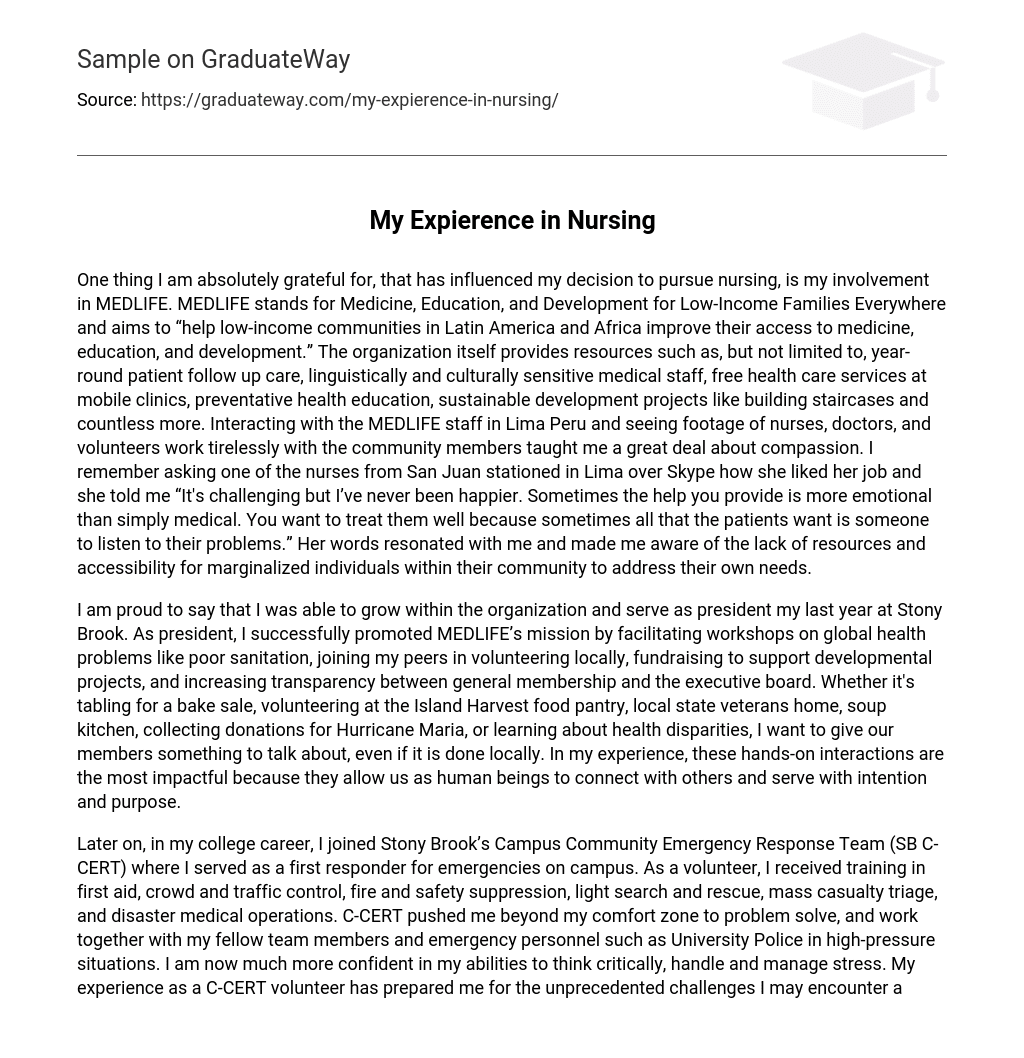One thing I am absolutely grateful for, that has influenced my decision to pursue nursing, is my involvement in MEDLIFE. MEDLIFE stands for Medicine, Education, and Development for Low-Income Families Everywhere and aims to “help low-income communities in Latin America and Africa improve their access to medicine, education, and development.” The organization itself provides resources such as, but not limited to, year-round patient follow up care, linguistically and culturally sensitive medical staff, free health care services at mobile clinics, preventative health education, sustainable development projects like building staircases and countless more. Interacting with the MEDLIFE staff in Lima Peru and seeing footage of nurses, doctors, and volunteers work tirelessly with the community members taught me a great deal about compassion. I remember asking one of the nurses from San Juan stationed in Lima over Skype how she liked her job and she told me “It’s challenging but I’ve never been happier. Sometimes the help you provide is more emotional than simply medical. You want to treat them well because sometimes all that the patients want is someone to listen to their problems.” Her words resonated with me and made me aware of the lack of resources and accessibility for marginalized individuals within their community to address their own needs.
I am proud to say that I was able to grow within the organization and serve as president my last year at Stony Brook. As president, I successfully promoted MEDLIFE’s mission by facilitating workshops on global health problems like poor sanitation, joining my peers in volunteering locally, fundraising to support developmental projects, and increasing transparency between general membership and the executive board. Whether it’s tabling for a bake sale, volunteering at the Island Harvest food pantry, local state veterans home, soup kitchen, collecting donations for Hurricane Maria, or learning about health disparities, I want to give our members something to talk about, even if it is done locally. In my experience, these hands-on interactions are the most impactful because they allow us as human beings to connect with others and serve with intention and purpose.
Later on, in my college career, I joined Stony Brook’s Campus Community Emergency Response Team (SB C-CERT) where I served as a first responder for emergencies on campus. As a volunteer, I received training in first aid, crowd and traffic control, fire and safety suppression, light search and rescue, mass casualty triage, and disaster medical operations. C-CERT pushed me beyond my comfort zone to problem solve, and work together with my fellow team members and emergency personnel such as University Police in high-pressure situations. I am now much more confident in my abilities to think critically, handle and manage stress. My experience as a C-CERT volunteer has prepared me for the unprecedented challenges I may encounter as an aspiring nurse.
My passions for working with underserved populations continued after college. This summer, I was granted the opportunity to intern at Heritage Integrated, a community based primary care practice in Brooklyn. Upon speaking to the site’s nurse manager, I was humbled to learn that the practice followed a patient-centered medical home model and shared a commitment to serving minorities. At Heritage Integrated, I played a dynamic role in performing both administrative duties and clinical duties. I helped set up examination rooms, record medical histories, gather patient clinical data and make phone calls to advocate on behalf of the patient. At this job, I had to be professional, organized, resourceful and always ready to engage with patients and medical staff. I encountered many patients with chronic health issues like diabetes, hypertension, and gained profound insight into the different challenges each patient faced due to lack of resources, lack of confidence, or lack of a true understanding of their medical problems. It was through these discussions that I began to recognize how important it was to take time to educate, set, and prioritize health goals with each individual and encourage them to be proactive in making positive lifestyle changes. I took every patient encounter as an opportunity to initiate a conversation and introduce new wellness strategies. This experience has caused me to reflect on how critical it is as nurses to constantly expand our knowledge on emerging illnesses and new advances in healthcare.
As I reflect on how I can grow through a nursing education, I appreciate the emphasis on clinical skills, critical thinking, cultural competence, and leadership at the Lienhard School of Nursing at Pace University. It inspires me that at the Lienhard School of Nursing, I can learn not only how to help individuals live their highest quality of life but also create social change. In the future, I would like to help those less fortunate live healthy lives so they can be whatever and whoever they want to be. The accelerated nursing program at Pace is a great fit for me because it aligns with my values on cultivating intellectual and professional development by challenging oneself, while still advocating for patients’ needs and concerns. It would be an absolute honor to continue my studies in the accelerated nursing program at Pace University where I hope to make significant contributions to my future patients, family, community, and the nursing profession.





